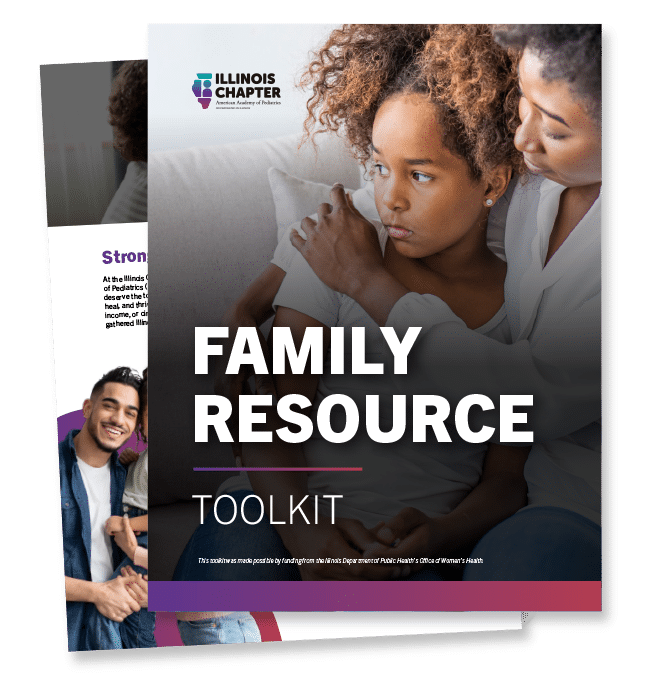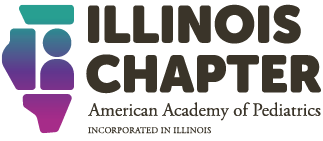Adverse Childhood Experiences
Resources & Guidance for Addressing Adverse Childhood Experiences (ACEs)
Adverse Childhood Experiences or ACEs are potentially traumatic events that happen in childhood and can have long-term impacts on health, opportunity and well-being.
A Note from the AAP:
As a pediatric professional, you are well-positioned to promote safe, stable, nurturing, relationships (SSNRs) by translating advances in developmental science into effective interventions for the home, clinic, and community.
To that end, practice leadership buy-in, provider and managerial support and staff development is instrumental to advancing and implementing changes to enhance practice and office workflow to help children build safe, stable nurturing relationships, and protect them from the damaging effects of toxic stress.

Our Role in Addressing ACEs
ICAAP is funded through the Illinois Department of Public Health to advance efforts to prevent, mitigate, and treat childhood adversity and trauma in Illinois through an equity lens.
Our work includes guidance and activities that use evidence-based approaches to:
- Bring additional awareness and understanding of ACEs
to pediatric health care settings and how they impact the health and development of a child. - Educate and support pediatric health care professionals
on how to partner with families and communities to promote relational health. - Develop and disseminate educational materials
for health care professionals and their patients around toxic stress, safe stable nurturing relationships (SSNRs) and more.
The Family Resource Toolkit
A Comprehensive Set of Resources to Share with Families

Grounded in the belief that support makes a difference, our Family Resource Toolkit equips clinicians with curated, Illinois-specific resources to help families overcome the challenges that may lead to, or result from, ACEs.
By proactively sharing these resources, you can extend their impact beyond the exam room. The toolkit includes practical guidance and links to support systems addressing trauma, housing, food security, employment, mental health, and more.
How to Use This Toolkit in Practice
- During Appointments
Print and walk families through relevant sections. Tailor resource suggestions to specific needs discussed during the visit. - Follow-Up Communication
Email or text the toolkit link after visits to reinforce support and provide easy access to helpful services. - In Office Displays
Keep copies in waiting areas or patient rooms to encourage exploration and engagement. - Online Platforms
Share the toolkit on your website, patient portals, or social media to normalize help-seeking and promote community wellbeing. - Staff Training
Use the toolkit during team meetings to familiarize care teams with local supports and integrate into care coordination.
2025 ACEs Webinar Series
Strategies for Addressing Adverse Childhood Events in Your Practice
Join us for a webinar series focused on:
- Ways to identify ACEs
- How to integrate and plan for ACEs
- New strategies to bolster trauma-informed care
- Connecting with community resources to mitigate ACEs
Connect with subject matter experts and professional peers during three live webinars in 2025, including:
Register Today to Build New Strategies to Mitigate ACEs!

January 30, 2025
Building Brighter Futures: Practical Strategies for ACEs in Pediatrics
Kristen Kenan, MD, MPH, FAAP
March 20, 2025
Trauma-Informed Care: Creating a Safe Space within Your Practice
Bako Orionzi, MD, FAAP
April 17, 2025 ![]()
Resilience Through Connection: Leveraging Community Partnerships to Mitigate ACEs
Interactive Q&A session with community partners and organizations to discuss practical strategies for collaboration and resilience-building in pediatric care.
Moderated by Kristen Kenan, MD, MPH, FAAP
Resources to Better Address
Adverse Childhood Experiences
Identify and address ACEs in your practice with these vetted, evidence-based resources:
AAP Recommends Public-Health Approach to Helping Trafficked Youth
An AAP policy statement calls for increased awareness, public policies, training, and education about children and teens who are exploited and trafficked for labor and sex in the U.S. The statement recommends using a public-health approach to identify and care for exploited young people.
Screening for ACES
Understand the relationship between screening for ACEs and improved identification and referrals.
Addressing ACES in Primary Care
This article draws attention to the overlapping literature on social determinants of health and adverse childhood experiences, and the growing clinical interest in addressing them to promote children’s and parents’ health and well-being. We address important considerations and suggest solutions for leaders and practitioners in primary care to address social determinants of health/adverse childhood experiences.
AAP: Addressing Adverse Childhood Experiences in Primary Care
Preventing Childhood Toxic Stress
This revised policy statement on childhood toxic stress acknowledges a spectrum of potential adversities and reaffirms the benefits of an ecobiodevelopmental model for understanding the childhood origins of adult-manifested disease and wellness. It also endorses a paradigm shift toward relational health because SSNRs not only buffer childhood adversity when it occurs but also promote the capacities needed to be resilient in the future.
The AAP Trauma Toolbox for Primary Care
This 6-part series was designed with the primary care practice in mind – those who may or may not be familiar with ACEs and the process of asking families about exposure to ACEs or other traumatic events.
Homelessness & Adverse Childhood Experiences
This fact sheet was developed by the National Health Care for the Homeless Council and the National Network to End Family Homelessness to ensure clinicians working with people experiencing homelessness understand the role of ACEs in health outcomes as well as the options for responding.
National Childhood Traumatic Stress Network
This unique network of frontline providers, family members, researchers, and national partners is committed to changing the course of children’s lives by improving their care and moving scientific gains quickly into practice across the U.S. Get up-to-date information and resources trauma types, treatments, care, and resources.
AAP Trauma and Resilience Video Resources
This video-based series aims to empower pediatricians and healthcare professionals with the knowledge and skills to implement evidence-based, trauma-informed care and resilience promotion in their everyday practice. CME and MOC credit available for this course.
To Increase Health Throughout the Lifespan
Promote Positive Childhood Experiences (PCEs)
Safe, stable, nurturing relationships and environments can buffer children from this harm and prevent many ACEs from happening in the first place.
PCEs create a safe, stable, and nurturing environment that children and adolescents need to thrive. This does not have to be done by just a parent or caregiver. Other adults can provide these experiences and community resources can provide the support that families need.
Additional Resources
Early Relational Health Implementation Guide for Pediatric Healthcare Providers
Join the AAP’s Screening Technical Assistance and Resource Center for helpful on-demand access to patient outreach and guidance.
Screening Technical Assistance and Resource (STAR) Center
The STAR Center seeks to improve the health, wellness, and development of children through practice and system-based interventions to increase rates of early childhood screening, counseling, referral, and follow-up for developmental milestones, perinatal depression, and social determinants of health.

Addressing Systemic Causes of ACEs
At ICAAP, we are dedicated to fostering equitable access to healthcare, housing, food, and safety to help limit exposure to ACEs and mitigate adverse effects after they have occurred. Explore our key work below to help build your understanding and workflow around ACES:
